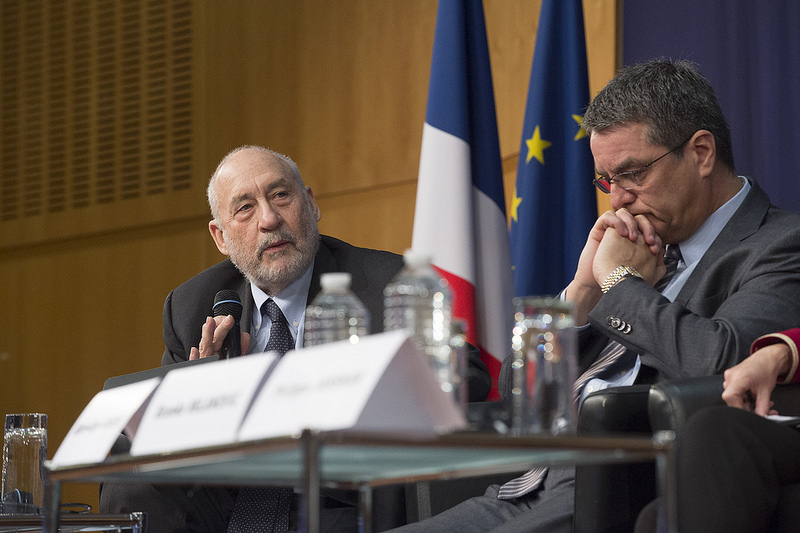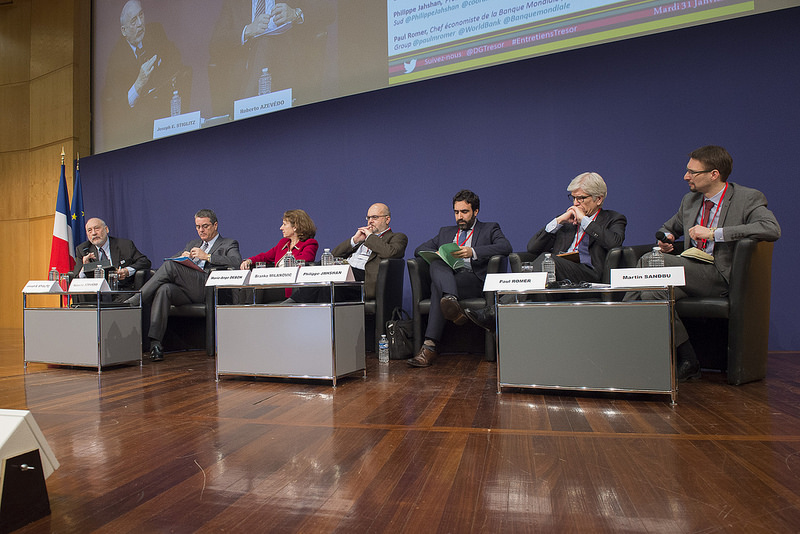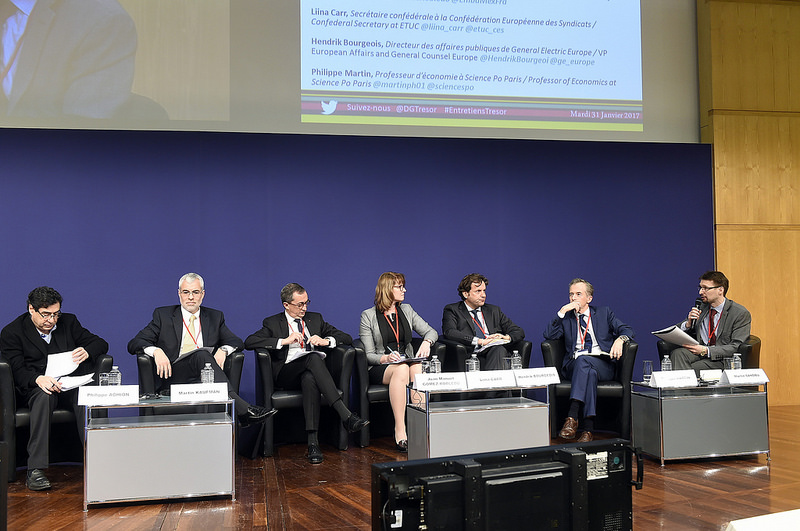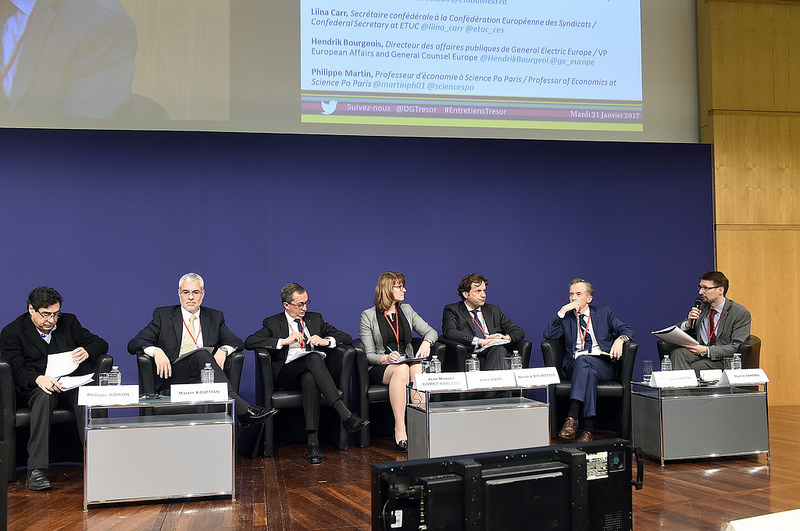Trade openness, growth and inequalities
Les Entretiens du Trésor is a yearly conference which focuses on a key economic issue and its associated policy challenges. This event is hosted by the French Treasury, at the Ministry for the Economy and Finance. Theme of the 2017 edition : “Trade openness, growth and inequalities”.
Joseph Stiglitz, Nobel Prize in Economics highlighted that doubts from the academic world have emerged regarding the capacity of international trade to generate positive gains unless it is better managed. In developed countries where there is no full employment, free trade may foster more job losses than job creation. Any limited gains are unequally shared, with unskilled workers benefiting the least from trade. Distribution effects, e.g. from weakened bargaining power, may even make them worse off. Measures of social support are required to compensate for the negative consequences of international trade.
Despite limited forecasted gains from trade agreements, Stiglitz argues that well-managed economic integration is still desirable. The reality of interconnected supply chains make protectionism very costly to national economies as well as the global economy. Trade barriers may lead to market inefficiencies and the appreciation of local currencies.
The international community is increasingly concerned about how to cope with the rise of protectionist measures in the US. According to Joseph Stiglitz, the rest of the world has a responsibility to strengthen and reform the international trade rules to make them more equitable in face of this American protectionist turn.
Roberto Azevêdo, Director General of the WTO reminded the audience that fears on the potential risks caused by trade liberalization had already been expressed by political leaders attending the last G20 summit. These objective difficulties are not questioning the economic benefits of trade openness. It creates jobs (20% of French employees work in exporting companies), it pushes prices down which thus accelerates consumption and supports improvement in living conditions of the poorest (1 billion people would have been risen out of poverty thanks to international trade).
Trade openness is often stigmatized as the unique responsible for the rise in inequalities. In fact, technological change causes 80% of job losses. It is a crucial diagnosis to undertake relevant economic policy reforms to fight against growing inequalities. Without more focus on improved national redistributive policies some countries will continue to see the unequal redistribution of trade liberalization gains.
Marie-Ange Debon, Vice President International Division CEO of SUEZ pointed out the fact that the debate on trade openness should not be limited the issues related to trade in goods. Trade in services and capital flows should also be duly taken into account. Foreign direct investments, such as infrastructures, including green ones, contribute to economic integration and reduction in inequalities.
Furthermore, analyzing international trade only through country-by-country trade is not the most relevant. A regional and territorial approach now seems more powerful to understand international trade. However it makes trade negotiations more complicated. For instance, infrastructure developments are designed across countries, and cities play a growing role in the expansion of international trade.
Branko Milanovic, Professor of Economics at City University of New York explained that two groups most benefited from globalization since the 1980s: middle classes from emerging countries and the top 1% in richest developed countries. Those who benefited but less from this period were lower middle classes from developed countries. While standards of living converged between people from developed and developing countries, inequalities increased inside developed countries. These patterns were partially caused by an unequal repartition of the gains from trade gains.
The fact that trade openness generates aggregated gains does not mitigate skepticism regarding the effective benefits from globalization for members of this “lost generation”, which lost their jobs and won’t be able to find a new one. Nevertheless, the major part of this shock looks behind us: 15% of world jobs are being currently affected by trade, while 30% of jobs were exposed during the previous period.
Philippe Jahshan, President of the NGO Coordination Sud voiced the predominant views of civil society on trade openness. According to him, there are risks that international trade negatively impacts the environment and hinders sustainable development, for instance by facilitating uncooperative olicies such as fiscal dumping which can contribute to the deterioration of public finances and interferes with State’s ability to pursue ambitious social measures. It also led middle class from developing countries to compete with middle class from developed countries, and this also increased competition with different social models. It can also negatively affect the climate, by increasing polluting freight transportation and marine transportation. Developing countries are far more affected on that front. Trade openness impoverishes local and familial farming, whereas they are crucial for subsistence and resiliency of entire populations. Every trade liberalization leads to winners and losers. However, losers lack compensations with respects to their needs. Thus, inequalities increase significantly. New generation agreements can even exacerbate these collateral damages, because they deal with regulations and they introduce a dispute settlement mechanism to resolve disputes, which might overlap with state competence to regulate. Democracy is the most important issue raised by trade agreements. Nevertheless, border shutdown is not the solution. Trade policy must be revised in order to make trade agreements not an end in itself, but a lever and an instrument for higher objectives such as sustainable development. Commercial law should not take over other laws. We should sign these agreements in coherence with other international agreements, social and environmental rules (e.g. COP, ILO) in order to ensure that trade supports a fair and sustainable project.
Paul Romer, Chief Economist of the World Bank Group suggested that debates regarding the economic impact of trade openness are a theoretical topic which generates ambivalent reactions because of ongoing socio-economic mutations. Thus we should focus on the concrete effects caused by trade openness. International trade allowed developing countries to improve their standard of living by helping them have access to new technologies. As no one is ready to give up these economic improvements, we can hope that developing countries will not follow developed countries’ example in turning back to protectionism.
Trade does not bear the sole responsibility for increasing inequality, and a whole array of public policies is available to States to cope with these collateral effects. Since the 1990s the US and Denmark have been confronted with the same economic mutations but they have not followed the same path in terms of inequality. Inequality has declined in Denmark (Gini coefficient went done from 31% to 21%) while it has increased in the US (Gini coefficient went up from 43% to 47%). Choosing protectionism is synonymous with not trying to deal with these redistributive fiscal challenges.
Jean-Luc Demarty, Director-General for Trade of the European Commission explained trade agreements are a ley vehicle to regulate globalization, by integrating new issues such as best practices and regulatory cooperation, social and environmental dimensions, intellectual property and investment protection, as well as disciplines in competition. To a large extent, monitoring norms is equivalent to monitoring markets (even if regulatory cooperation doesn’t mean co-legislating), whose openness remains a key determinant of trade negotiations. Although trade generates losers, it is a positive sum game between countries and trade policy is not responsible for these negative externalities. However targeted adjusting policies such as training and social protection should accompany trade liberalization. We should also take into account civil society concerns as regards greater transparency in trade negotiations. By defending our economic interests, trade policy positively impacts growth and employment.
Sébastien Jean, Director General of the CEPII raised the question of the legitimacy of “new trade agreements” which includes nontrade chapters (social, environmental and fiscal clauses). Through these chapters, trade may be used as lever for increased cooperation in other fields. Supporting trade between two countries makes regulation discrepancies more costly. Yet, non-trade chapters may overload or paralyze negotiations – increasing the mixed nature of trade agreements – and bear the risk of interfering with national issues. Greater integration of non-trade chapters should be investigated. Different options should be studied such as: supporting a minimum level approach, binding automatic commitments, agreeing on auditable criteria and accepting to give up some trade negotiations if they conflict with other objectives. Indeed trade is more a tool than an end in itself.
Yann Delabrière, Chairman of Faurecia highlighted the priority given the current general context for preserving major regional trade agreements such as NAFTA. Any break in trade relations could have harmful effects on the US industry. Protectionist policies to support local production in Russia and Brazil in the automotive sector turned out to lead to blatant economic failures. 15-20% of North American automobile production and 50% of automobile components come from Mexico. The importance of challenges related to norms (electrical and connectivity ones) is going to increase because of the development of connected cars. Nowadays, the main part of industrial automobile production is made in South-East Asia (Philippines, Indonesia, and Thailand) and China will account for 60% of the world automobile market in 2030. Thus, the European Union should orientate its strategy towards Asia, and more precisely South-East Asia and ASEAN.
However, international trade is not the only one responsible for manufacturing sector difficulties in the US / UK. When you look at Germany for instance, you see a different trend. For 15 years, French production has decreased by 1.5 million while the exact opposite happened in Germany. Yet, they supported the same shocks. Education and interaction between public and private research are two other parameters that should be taken into account.
Pervenche Berès, Member of the European Parliament considers international trade is following cycles. We are currently experiencing a new model. Despite she doesn’t want to give up gains from trade and its redistributive fallouts, she raises out the fact that the overall economic context has changed:
1/ WTO did not meet expectations but it does not question all multilateral negotiations: COP was a success and a source of hope.
2/ The challenge of defining norms: emergence of new stakeholders such as China forced developed countries to define new rules more in line with developing country standards.
3/ new types of trade: goods and intangible products are not comparable. We underestimate new questions arising on protecting personal data.
4/ Trump coming to power may slowdown trade.
5/ Brexit: Theresa May has been in line with her political camp: she wants Great Britain to recover its ability to negotiate trade agreements.
According to Pascal Lamy, we are switching from protection to precaution agreements.The European Commission should take into account these mutations and propose a new doctrine. It should:
1/ respect of GI and SPM,
2/ Cope with fiscal issues by forcing better cooperation between countries,
3/ require an exhaustive list of public procurements,
4/ get dispute settlement mechanisms, permanent court or any other mechanism,
5/ ability for countries to refuse regulatory cooperation to respect capacity of states to legislate.
CETA does not meet these requirements. Access to markets is not the only one reason for questioning CETA. It’s a question raising lawmaker concerns and which fuels transparent critics. With that route, we should redesign the whole international trade doctrine. Meanwhile, we should also react to potential fiscal dumping from Great-Britain. Pervenche Berès added that: “Fair global economy is much richer than Free Trade.”
Guntram Wolff, Director of the think-tank Bruegel indicates that many countries have benefited from economic integration. It is for instance the case in Europe where we have seen a reduction in inequalities and a convergence of standards of living thanks to the economic catch-up of Eastern European countries supported by Union integration dynamics. Moreover, Europe’s social models have been better in reducing inequality than the “Anglo-Saxon” social models.
Donald Trump seems to try revitalizing manufacturing employment thanks to protectionist measures but it won’t help the American economy in the long run. It could have damaging economic consequences for Europe. Trade slowdown between the US and Europe could lead to a 0.4% decrease in GDP and 240,000 job destructions according to a recent paper by Hylke Vandenbussche (those figures may be under-estimated because European vulnerability to American investments is insufficiently reflected in the model). WTO should address increasing risks of the rise in trade barriers from the US and EU should support WTO. The EU should have fiscal and other measures ready to react if the US administration decides to introduce measures that are not compatible with WTO against EU.
Philippe Aghion, Professor at the Collège de France presented briefly his economic analysis on the relation between trade growth and innovation based on Schumpeterian theory of growth. Long-term growth is supported by innovation in developed countries. On the one hand trade contributes to growth through innovations thanks to three mechanisms: it increases market volume (market size effect) and thus incomes from innovation. It stimulates competition (competition effect) and facilitates technology transfer. On the other hand, trade generates inequalities and weakens low-skill workers and those who find it hard to adapt to change. Ensuring that economic liberalization of trade is correlated with an inclusive educational system is crucial. Reforming the labor market to provide genuine security for career paths is also essential. Not supporting trade liberalization with active policies in education, training and individual protection to cope with risks related to creative destruction would be a serious mistake. Reagan and Thatcher liberalization policies missed the inclusive dimension. They lead to populist stalemates in the Unites-States (with Trump) and in Great-Britain (with Brexit).
Martin Kaufman, Assistant Director Strategy, Policy and Review Department, IMF emphasized that in past years the focus was on how to advance trade integration, regionally and globally, in a context of new trade policy frontiers (e.g., non-tariff barriers, regulatory coherence, protection of physical and intellectual investment); the advent of global supply chains and production fragmentation;
and services as the next ‘extensive margin’ for trade. The challenge now is how to advance trade integration in a different context
of greater distrust about globalization in many countries and avoid potential escalation of trade tensions. This would require restating
and re-thinking key questions: How to make trade work for all? How best to address possible dislocations? What is the role for re-training and addressing other barriers to labor and resource re-allocation to those sectors of the economy that would be expected to expand? How to address such dislocation in an integral way in any future trade initiatives?
Mrs. Liina Carr, Confederal Secretary at ETUC emphasized that ETUC is not againsttrade. However it considers that current trade negotiations are not meeting trade union expectations for two reasons:
(i) trade agreements are negotiated secretly
(ii) trade negotiations which do not deal only with tariff barriers do not take into account the trade unions and Civil society concerns especially as regards public service protection and sovereign right to regulate (workers’ rights and working conditions, social and environmental norms, health and consumer protection).
They are questioned by dispute settlement mechanisms between investors and States which imply a separate legal system. More generally, Mrs. Carr is supporting closer cooperation between WTO and ILO. Globalization should take into account Human rights as well as social and environmental problematics. National social models and trade policies should be better articulated, especially in developing countries. Fiscal coordination at the international level should be
also addressed as it has direct implications on firm competition and employment.
Based on his experience in Mexico, Juan Manuel Gomez Robledo, Ambassador of Mexico in France explained that articulation between multilateral trade system and regional trade agreements works well and facilitates regulation of trade frictions. Mexico signed up to the GATT in 1986 while concluding many regional and bilateral free-trade agreements (46). There are other ongoing negotiations with Jordan, Turkey, Brazil and Argentine. Mexico negotiated agreements on investment protection as well to strengthen credibility and attractiveness of the country towards international investors.
According to the Ambassador, multilateral and regional approaches have additional benefits. Regional trade agreements supported growth of trade flows while being in accordance with WTO rules. At that time, legal experts feared that multiplying trade agreements could lead to a legal chaos. In practice, this risk has remained theoretical. Mexico experienced many times WTO and regional dispute settlement procedures (as advocate or complainant) and considers that their solutions is relevant to cope with trade frictions.
According to Hendrik Bourgeois, VP European Affairs and General Counsel Europe, General Electric Europe while trade openness and globalization support innovation, entrepreneurship, competition and growth protectionist barriers are on the rise. International trade serves as a scapegoat for all types of critics on growth, employment and growing inequalities. However productivity is the main challenge. International trade is no longer a technical field. It is now a highly political topic which fuels critics. It is partly due to the fact that trade agreements deal now with regulatory and environment topics. The European Union should rethink governance and political trade mechanisms. The European Commission has an exclusive competence regarding trade which makes its decisions difficult: it needs a strong political mandate to lead trade negotiations in a more legitimate and inclusive manner, while trying to support SME.
While the positive impacts of international trade on wealth is widely shared between economists, Philippe Martin, Professor of Economics at Science Po Paris points out the fact that there is no consensus on the means to mitigate inequalities fostered by globalization. Public policies failed to redistribute efficiently to the losers of globalization benefits from trade either through fiscal policies or through professional training and education. Globalization is not politically sustainable if, at a time when inequalities are increasing, governments see their tax base move to other countries, which implies lower capacities of financing public policies. Making globalization more acceptable is through managing financial globalization by fighting against non-cooperative fiscal strategies and tax evasion. The European Union should use trade agreements as instruments to promote fiscal cooperation. The link between trade and taxation arose still more strongly with the arrival of the new American government, which aims to reduce corporate taxation, and with future trade negotiations following Brexit.
M. Angel Gurria, Secretary-General of the OECD spotlighted the fact that we are going through a critical period with general loss of
confidence and since a decade in OECD countries a deep increase in income and wealth inequalities (In OECD countries, the revenue of the richest 10% is now 10 times higher than the revenue of the poorest 10%, whereas the gap was equal to 7 in 1980). There are several causes for reluctance to globalization and its consequences are obvious. It implies an amplification of protectionist threat. Globalization should be “more inclusive” integrating new concepts such as cooperation and shared commitments. It should also support more inclusive productivity. Due to the slowdown in productivity growth and the surge in inequalities the OECD has launched several studies on the links between productivity and inequalities (topic discussed during the 2016 Ministerial Council Meeting and a paper published on “productivity and inequalities”). Public leaders should take into account the transformations as well as the risks induced by automation for a segment of population (PIAAC study of the OECD; new horizontal project of the OECD on digital transformation supporting inclusive growth and well-being). The OECD is currently leading a major tax reform to support justice and transparency. Tax international cooperation especially with BEPS project (“Base Erosion and Profit Shifting”) and the automatic exchange of information are essential. The theme for this year’s OECD Ministerial Council Meeting which will take place in June 2017 will be “Making globalization work: better lives for all”.




